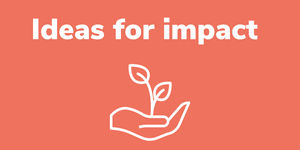In a recent blog, we shared how seeding innovation is a core part of our approach - allowing us to then scale what works with partners. But what do we mean by innovation - and how does an idea become an investment?
Innovation at Big Society Capital means working with partners to find new ways of tackling social problems using existing or new finance tools. In some cases, this can be developing new financial structures or products to address a social problem; in others it can be using existing tools and configuring them in new ways. We want to open the space for ideas from outside of our organisation and be directed as far as possible by where that impetus for innovation comes from.
Here’s what we have learnt so far from taking the seeds of an idea and working with partners to develop these into a fund.
- Social issue: get to the root of the issue and build around the need
We partnered with urban health foundation Guy’s & St Thomas’ Charity, experts in understanding childhood obesity, to better understand what solutions might be required and what role repayable finance might place in addressing this challenge. Through working with Guy's & St Thomas' Charity, who have the expertise and deep understanding of the social issue, including the importance of access to good food particularly in low income areas, we developed the Good Food Fund, a new business accelerator and venture fund backing healthier food and drink brands to help tackle childhood obesity.
Key questions to ask: Is there a better way to meet the needs of people experiencing this issue? - Enterprises: understand the business models
We focus on social issues where we believe the organisations tackling them have a business model to do so. And where that model could both benefit from taking on investment, but could also generate a return that is suitable for both enterprises and investors.
For example, for Fair By Design, a venture fund investing in early-stage businesses tackling the poverty premium in the UK, we saw that there was an opportunity to create new impact ventures that were designed around the needs of low income customers. The fund provided early support to Wagestream, a fintech startup that partners with employers to give employees access to wages as they are earned, reducing reliance on payday lenders. We worked with our partners to map the potential business models of ventures addressing the poverty premium before building a picture of potential finance and support needs of those models.
Key questions to ask: where can enterprises be bolstered, replicated or scaled up? What types of money might they need to do this? - Investment: connect enterprise needs with investors
When we have a clearer sense of business models, we explore what financing and other support are needed to help these organisations deliver better outcomes for more people and where this investment and support might come from.
Women in Safe Homes fund (WISH), believed to be the world’s first gender-lens property fund, is one solution to the lack of safe homes for women who are experiencing or at risk of homelessness, many of whom are survivors of domestic abuse.
We spoke to 60 women’s sector organisations who told us about their needs and expressed a growing interest in leasing properties as emergency and move-on accommodation. The fund was then developed in partnership with the Preston Road Women’s Centre in Hull, who had pioneered the model, and fund managers, Resonance and Patron Capital. With an understanding of the needs of women’s sector organisations and the finance needs of affordable housing models, we engaged with investors to develop appropriate terms and a structure for the property fund that could bring these together.
Key questions to ask: Who might invest in this idea? What are their needs and expectations? - Partners: who is needed for the idea to succeed
We cannot create impactful solutions alone, and we are keen to listen out for great ideas from social innovators. Fair By Design was developed in partnership with the Joseph Rowntree Foundation and other experts in poverty, and for WISH we gained insights from experts such as Women’s Aid. This year, we launched a monthly Innovation Scrum to hear how other funders innovate and to encourage greater collaboration and sharing.
Key questions to ask: Who are the key partners needed at different stages of developing an idea from seed to scale? What do each of them bring?
When these four elements come together, ideas can turn into social impact investment funds and go on to have a significant impact. We are testing new ways of seeking out and supporting ideas by:
- Opening up to more ideas from fund managers and social innovators
- Building a bigger pool of resources to support the development of ideas in partnership with others
- Learning from others how best to seed and support innovation
Do you have an idea as to how social investment can address a social issue, with potential to scale and/or contribute to transformational change post COVID-19?
In 2021, we will be launching Ideas for Impact, a call for ideas with potential to scale. Ideas which align with the four principles above may receive development funding and support.
Stay tuned for information and webinars on Ideas for Impact and look out for more details on Twitter and LinkedIn.


